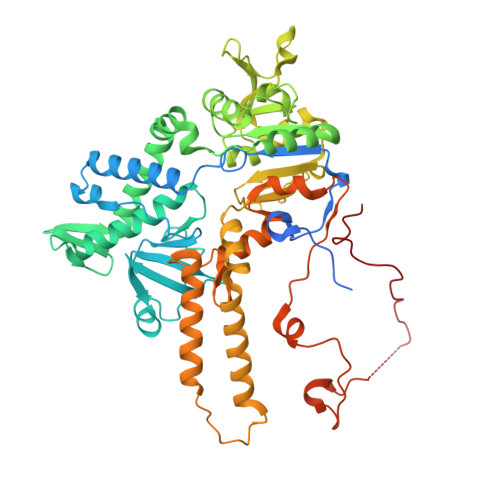Structure and Mechanisms of NT5C2 Mutations Driving Thiopurine Resistance in Relapsed Lymphoblastic Leukemia.
Dieck, C.L., Tzoneva, G., Forouhar, F., Carpenter, Z., Ambesi-Impiombato, A., Sanchez-Martin, M., Kirschner-Schwabe, R., Lew, S., Seetharaman, J., Tong, L., Ferrando, A.A.(2018) Cancer Cell 34: 136-147.e6
- PubMed: 29990496
- DOI: https://doi.org/10.1016/j.ccell.2018.06.003
- Primary Citation of Related Structures:
6DD3, 6DDB, 6DDC, 6DDH, 6DDK, 6DDL, 6DDO, 6DDQ, 6DDX, 6DDY, 6DDZ, 6DE0, 6DE1, 6DE2, 6DE3 - PubMed Abstract:
Activating mutations in the cytosolic 5'-nucleotidase II gene NT5C2 drive resistance to 6-mercaptopurine in acute lymphoblastic leukemia. Here we demonstrate that constitutively active NT5C2 mutations K359Q and L375F reconfigure the catalytic center for substrate access and catalysis in the absence of allosteric activator. In contrast, most relapse-associated mutations, which involve the arm segment and residues along the surface of the inter-monomeric cavity, disrupt a built-in switch-off mechanism responsible for turning off NT5C2. In addition, we show that the C-terminal acidic tail lost in the Q523X mutation functions to restrain NT5C2 activation. These results uncover dynamic mechanisms of enzyme regulation targeted by chemotherapy resistance-driving NT5C2 mutations, with important implications for the development of NT5C2 inhibitor therapies.
Organizational Affiliation:
Institute for Cancer Genetics, Columbia University, New York, NY 10032, USA.
















